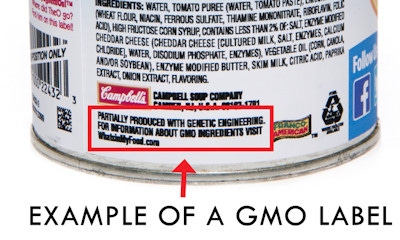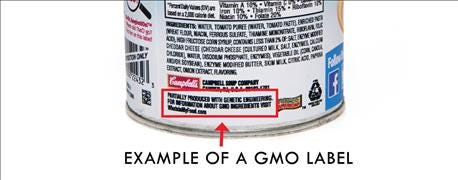
Unable to find middle ground on a voluntary food labeling solution, the Campbell Soup Company announced it would support federal legislation to establish a single mandatory labeling standard for foods derived from genetically modified organisms.
The move is significant for a company that since 2011 lobbied alongside hundreds of other food companies and the Grocery Manufacturers Association on Capitol Hill for a voluntary labeling solution. However, Campbell’s president and chief executive officer Denise Morrison says despite these efforts, Congress has not been able to resolve this issue.

Campbell Soup Company shared its approach to GMO labeling as food makers deal with what may become a patchwork of state-based labeling laws.
“We now believe that proposing a mandatory national solution is necessary. Printing a clear and simple statement on the label is the best solution for consumers and for Campbell,” Morrison said in a message to her employees about the reasons behind the decision.
The company will advocate for federal legislation that would require all foods and beverages regulated by the Food and Drug Administration (FDA) and the U.S. Department of Agriculture (USDA) to be clearly and simply labeled for GMOs. Campbell’s is also supportive of a national standard for non-GMO claims made on food packaging.
The company continues to oppose a patchwork of state-by-state labeling laws, which it believes are incomplete, impractical and create unnecessary confusion for consumers. As a result of its decision to support mandatory national GMO labeling, Campbell will withdraw from all efforts led by coalitions and groups opposing such measures, the company said.
Vermont passed legislation that will require food companies including Campbell to label products regulated by the FDA that may contain ingredients made from GMO crops. However, this legislation does not include products with meat or poultry, because they are regulated by USDA.
Under Vermont law, SpaghettiO’s original variety, guided by the FDA, will be labeled for the presence of GMOs, but SpaghettiO’s meatballs, guided by the USDA, will not. Yet these two varieties sit next to each other on a store shelf, which is bound to create consumer confusion.
Campbell’s said it is optimistic a federal solution can be established in a reasonable amount of time if all the interested stakeholders cooperate. However, if that is not the case, Campbell is prepared to label all of its U.S. products for the presence of ingredients that were derived from GMOs, not just those required by pending legislation in Vermont. The company would seek guidance from the FDA and approval by USDA.
The company said it continues to recognize that GMOs are safe, as the science indicates that foods derived from crops grown using genetically modified seeds are not nutritionally different from other foods. The company also believes technology will play a crucial role in feeding the world.
Increasing transparency
Morrison says, “Put simply, although we believe that consumers have the right to know what’s in their food, we also believe that a state-by-state piecemeal approach is incomplete, impractical and costly to implement for food makers. More importantly, it’s confusing to consumers.”
Campbell has been engaged in the conversation about GMO labeling for several years and has taken action to provide consumers with more information about how its products are made, including the presence of GMOs, through efforts like its website www.whatsinmyfood.com. With 92% of Americans supporting the labeling of GMO foods, Campbell believes now is the time for the federal government to act quickly to implement a federal solution.
“Our support of mandatory federal GMO labeling sets a new bar for transparency,” says Morrison.
Charlie Arnot, chief executive officer of The Center for Food Integrity (CFI), says Campbell’s decision “demonstrates leadership when it comes to transparency.”
The GMO issue is a high-profile and particularly polarizing issue that’s on a growing list of issues consumers are interested in knowing more about, he says.
“Our consumer research indicates that ‘GMO’ has become an icon for what is perceived as an industrialized food system,” says Arnot. “The concerns expressed are often less about GM technology and more about other issues tied to today’s food system.”
Technology, including biotechnology, brings immeasurable benefits to consumers and society, but broad public support for technology will increasingly depend on the level of transparency and consumer engagement by those in the food system, he concludes.
About the Author(s)
You May Also Like






